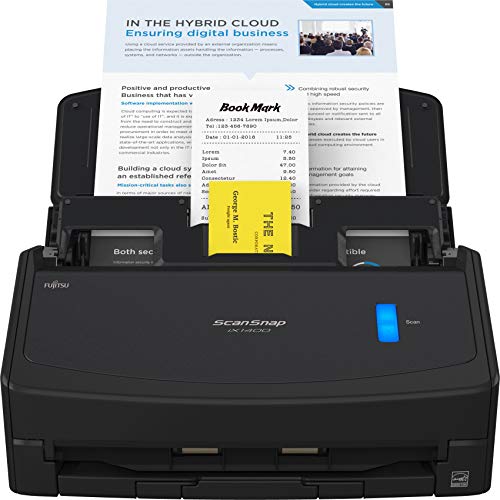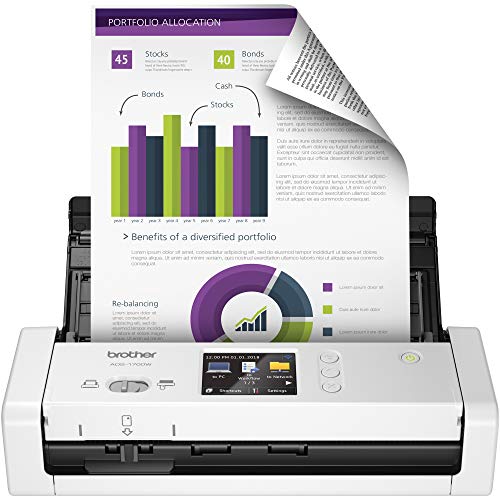Top 17 Best Scanners For Paperless Home Office In 2024
Brandon Forder Apr 20, 2024 1:17 AM
If you're considering going paperless, not every scanner is a good choice. You'll want one that can scan your receipts, documents, and other irregularly shaped paper, and one with decent software support so you can keep everything neat and tidy. Based on your votes, we've compiled a list of the top five.
Earlier this week, we polled you on your favorite document scanners. Not just any scanner or multi-in-one printer/scanner/copier, but the best document scanners for helping you digitize your paper records. We've taught you how to go paperless with any scanner, though we do have a personal preference, and answered some of your questions after the fact. To help you get started on your journey toward a paperless home office, we've compiled a list of the top scanners as recommended by you, our readers.

Compare Products
- SCORE9.4
- BrandFujitsu
- Prime
- SCORE9.2
- BrandCanon
- Prime
- SCORE8.8
- BrandEpson
- Prime
- SCORE8.6
- BrandEpson
- Prime
Last update on 2024-04-20 / Affiliate links / Images, Product Titles, and Product Highlights from Amazon Product Advertising API
Types of scanner
Desktop Scanners
Desktop scanners are the smallest option, and their compact form factor means they won't take up too much room on your desk.
Despite its compact form factor, desktop scanners are capable of massive throughput. We can streamline the document storage procedure with the help of the compact desktop scanners because they all work well with our software. Some document scanners even have optional features, like network connectivity and flat beds for scanning passports and tiny documents.
These portable document scanners are ideal for use in offices of any size.
Departmental Scanners
Departmental scanners are much larger than desktop scanners and are designed to function continuously throughout the day. Even though they can be placed on a desk, they are bulkier than standard desktop scanners.
Each department's scanner is equipped with the state-of-the-art document handling technology, including Perfect Page technology, which allows for scanning at a greater quality than the original.
Offices that regularly handle large volumes of documents, such those at law firms and insurance companies, often invest in dedicated departmental scanners.
Production Scanners
Production scanners have unprecedented processing capability, scanning up to 210 pages per minute and 150,000 documents per day. These massive scanners are perfect for huge, high-volume offices like government agencies and major corporations.
While production scanners have their uses, they are usually too large for use in offices of any size.
Types of media
To find the best scanner, this is the most crucial consideration. The level of complexity in your need to digitize documents depends on the type of document and the intended use of the data contained inside. Scanners that can handle big quantities without requiring cutting-edge features are ideal for straightforward applications like back-scanning records in your file cabinets to conserve space. If you need to extract digital information for use in other digital business applications, you should look for more sophisticated characteristics such as searchability and indexing. Invoices, medical records, bills of lading, applications for loans or new clients, and documentation for new employees are all examples of documents that could benefit from being included into company systems. After deciding what needs to be scanned, you can dive into the intricacies of the models and the appropriate checklist of scanning features. (The remaining inquiries will provide light on these specifics.)
Scan time
What kind of scanner you require depends on how much scanning you need to do every day. Purchasing a high-volume scanner is not practical if you just intend to scan a few items each day. A tiny office scanner, a multifunction printer (MFP) with built-in scanning, or even a smartphone app are all viable solutions for occasional scanning tasks. What do you hope to achieve with these records is the most important question to ask. These alternatives work well for lower numbers, but you should be prepared to make sacrifices in terms of features, performance, or reliability. If you have low-volume demands but want more advanced features, an entry-level business scanner is the way to go.
A company document scanner needs to be strong enough to handle the volume of paperwork it will be asked to scan. Take note of the scanner's duty cycle when comparing models based on the volume of daily scans they are designed to handle, as this information is typically provided in the product description. You should choose a model that operates at a volume that is lower than the maximum value specified for the duty cycle. You may compare the duty cycle of different scanners to get an idea of their durability and quality.
Resolution
The resolution requirements of most corporate document scanners are similar, hence this metric alone cannot be used to compare devices. The technology behind your chosen scanner and image capture software—image processing—is what really matters. The quality of the scanned image is crucial for accurate OCR results. Scanned images that are too blurry or too cluttered will be unreliable when fed into OCR software. This means you'll have to start the digitization process over, with team members spending a lot of time on things like document preparation for scanning and hand-keying for files that didn't convert correctly.
The manual stack in business processes can be reduced or eliminated altogether with the use of image processing skills provided by the correct technology stack. To get the most out of your money, your next scanning solution should include some crucial qualities.
Size
Mobile scanners are low-priced and convenient, especially for quick jobs. Desktop scanners are more cumbersome to move around, but they scan at higher resolutions and can do more work at once.
Software
Check out the scanner's supplied software to see if you can make searchable PDFs or edit photos.
Price
In most cases, purchasing a separate scanner is more cost-effective than purchasing an all-in-one device. The key is to not waste money on bells and whistles you won't ever use.
What is optical resolution on a scanner?
A scanner's ability to capture an image at a high level of detail depends on its optical resolution. Dots per inch (dpi) is the unit of measurement.
Are standalone scanners better than all-in-one printers?
All-in-one printers are convenient because of their space-saving and multitasking abilities, but specialized scanners will always be faster and more accurate.
Can I use my phone as a document scanner?
These days, you can even use your smartphone as a document scanner. If you don't usually need to scan products, this could be a good alternative for you. If you care about speed and quality, though, a dedicated scanner is your best bet.
In light of your newfound knowledge, you can turn your attention to the scanners themselves. If you're having trouble deciding what features you need in a document scanner, it may help to review the following list of questions.
Document management systems are essential for any organization that wants to go paperless (DMS). What good is it to scan your papers if you don't have automation tools to incorporate them into your workflow once they've been digitized? Scanned documents can move more quickly through your company's workflow if you use a DMS's workflow and integration options.




























